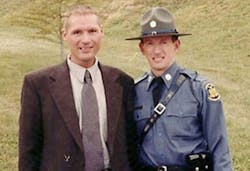When Missouri Highway Patrol Cpl. Dennis Engelhard died on an icy highway on Christmas Day 2009, he left behind a legal dilemma: Should his same-sex partner, who had been with him almost 15 years and with whom he was raising a son, be eligible for the survivor pension benefits that a traditional spouse would have received from the state?
In a decision sure to stoke the nation's ongoing debate over what constitutes a family, the Missouri Supreme Court ruled Tuesday that the answer is no.
In a 5-2 decision, the high court found that Kelly Glossip isn't eligible for pension benefits that would go to a spouse of a trooper killed in the line of duty because he and Engelhard weren't married.
The fact that they couldn't have been married in the eyes of Missouri law isn't relevant, the ruling states, because Glossip's lawsuit didn't specifically challenge Missouri's same-sex marriage ban.
The opinion goes to pains to separate the issue of Glossip's sexual orientation from his marital status.
"(The) statute does not discriminate on the basis of sexual orientation. Instead, it draws a distinction on the basis of marital status," the court said in the 20-page opinion. "Because Glossip was not married to Engelhard at the time of his death, he is not eligible for survivor benefits."
In a strongly worded dissent, Justice Richard B. Teitelman slammed the opinion as part of "the continued state-sanctioned marginalization of our fellow citizens."
"For decades, indeed centuries, gay men and lesbians have been subjected to persistent, unyielding discrimination, both socially and legally. That shameful history continues to this day," wrote Teitelman. "(State law) operates to the unique disadvantage of gay men and lesbians, even when, like Corporal Engelhard, they devote their lives to the defense of the same rule of law that relegates them to the status of second-class citizens."
Engelhard, 49, was killed when he was hit by a car while helping a motorist on Interstate 44 in Eureka. Glossip was subsequently denied survivor benefits through the state pension system.
Glossip sued on grounds of denial of equal protection, lost in circuit court and appealed to the state Supreme Court.
In a hearing earlier this year, Glossip's attorney argued that the relationship Engelhard and Glossip shared was "almost synonymous with opposite-sex, husband and wife" relationships. The couple owned a home in Franklin County, had joint bank accounts and were rearing Glossip's son.
The state argued that the pension law provided support only for opposite-sex spouses and children.
The court's ruling Tuesday stresses repeatedly that it isn't a statement on the validity of Missouri's same-sex marriage ban. "That is an issue for another day," wrote the court.
Glossip didn't specifically challenge that ban, but he did argue that the word "spouse," as used in the statute regarding survivor benefits, shouldn't be defined to apply only to heterosexual couples.
"If Glossip and the deceased patrolman had been married in another state (or country), Glossip could have challenged the statute that prohibits recognizing same-sex marriages for purposes of Missouri benefits. But they were not," wrote the court. "Glossip could have challenged Missouri's constitutional provision that precluded him and the patrolman from marrying here. But he did not. Therefore, these questions must go unanswered."
Teitelman was joined in his dissent by Justice George Draper. Joining in the unsigned majority opinion were justices Mary Rhodes Russell, Patricia Breckenridge, Zel Fischer, Laura Denvir Stith and Paul Wilson.
The ruling isn't subject to appeal to the U.S. Supreme Court because it didn't deal directly with federal or U.S. constitutional issues.
Missouri Attorney General Chris Koster's office, which defended the state's position in the case, declined to comment on the ruling.
Glossip's legal team included lawyers from the American Civil Liberties Union. In a statement, ACLU attorney John Knight expressed disappointment at the ruling but said he was "hopeful this case will help the people of Missouri understand the crucial need for legislative efforts to overcome discrimination against lesbians and gays and same-sex couples."
"Limiting benefits to married couples while denying same-sex couples the freedom to marry is discrimination plain and simple," wrote Knight.
A spokesman for the Family Research Council, a national organization that argues against same-sex marriage, called the ruling a "significant" victory.
"Granting these benefits is just a steppingstone to redefining marriage," said Peter Sprigg, senior fellow for policy studies at the organization. He said the suit was attempting "an end run" around Missouri's same-sex marriage ban.
"The Supreme Court quite reasonably said, 'No, you can't do that, the definition of marriage is settled in this state,' " Sprigg said.
In a statement on his Facebook page after the court's ruling was released, Glossip wrote: "We may have lost this battle, but we've educated thousands if not millions in Missouri, nationwide and worldwide." The statement goes on to say Glossip will continue to fight for a change in state law.
Doug Moore of the Post-Dispatch contributed to this report.
Copyright 2013 - St. Louis Post-Dispatch
McClatchy-Tribune News Service



